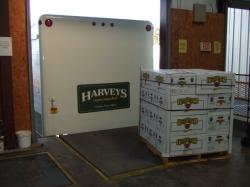FirstFruits Makes First Donation Linked To 1 Million Apples Campaign
November 24, 2010 | 1 min to read

YAKIMA, Wash., November 23, 2010 – FirstFruits Marketing today announced it had shipped the first apple donation associated with its national “Take a Bite Out of Hunger” campaign. Nearly 700 cases of fresh apples was delivered this week to food banks in rural Georgia thanks to Harvey’s Supermarkets participation in the program.
Before January 31, FirstFruits grower-owners aim to donate one million apples to local food banks throughout the U.S. Ten retailers have joined the effort since October, with more than 2000 cases of apple donations already accrued.
“Thanks to enthusiastic retail partners, the campaign is off to an inspiring start,” commented Keith Matthews, chief executive officer of FirstFruits Marketing. “We’re grateful to work with retailers who share our commitment to reducing hunger and food insecurity, and we’re proud to help them give back to local communities during this holiday season.”
The promotion is available to all U.S. retailers and is timed to coincide with holiday food drives. Apple donations are earned through both sales and promotional efforts based on in-store advertising, store signage and display contests to promote the program. Consumers can also boost total donations directly by purchasing “virtual apples” from the FirstFruits website.
In addition to promotionally themed packaging, the campaign is supported with in-market media, as well as supplementary materials such as high-graphic display bins, posters and sign cards upon request.
Source: First Fruits Marketing
